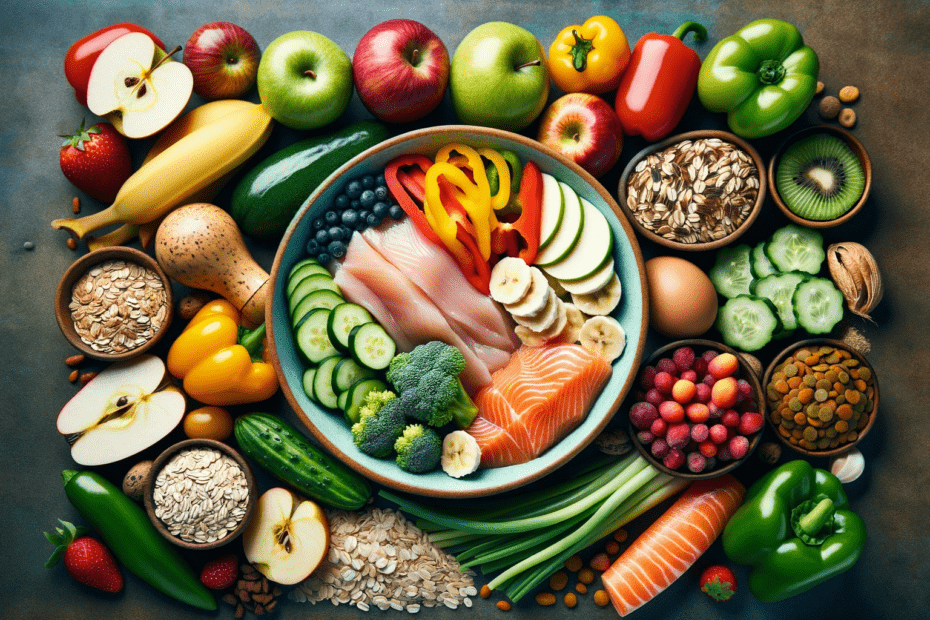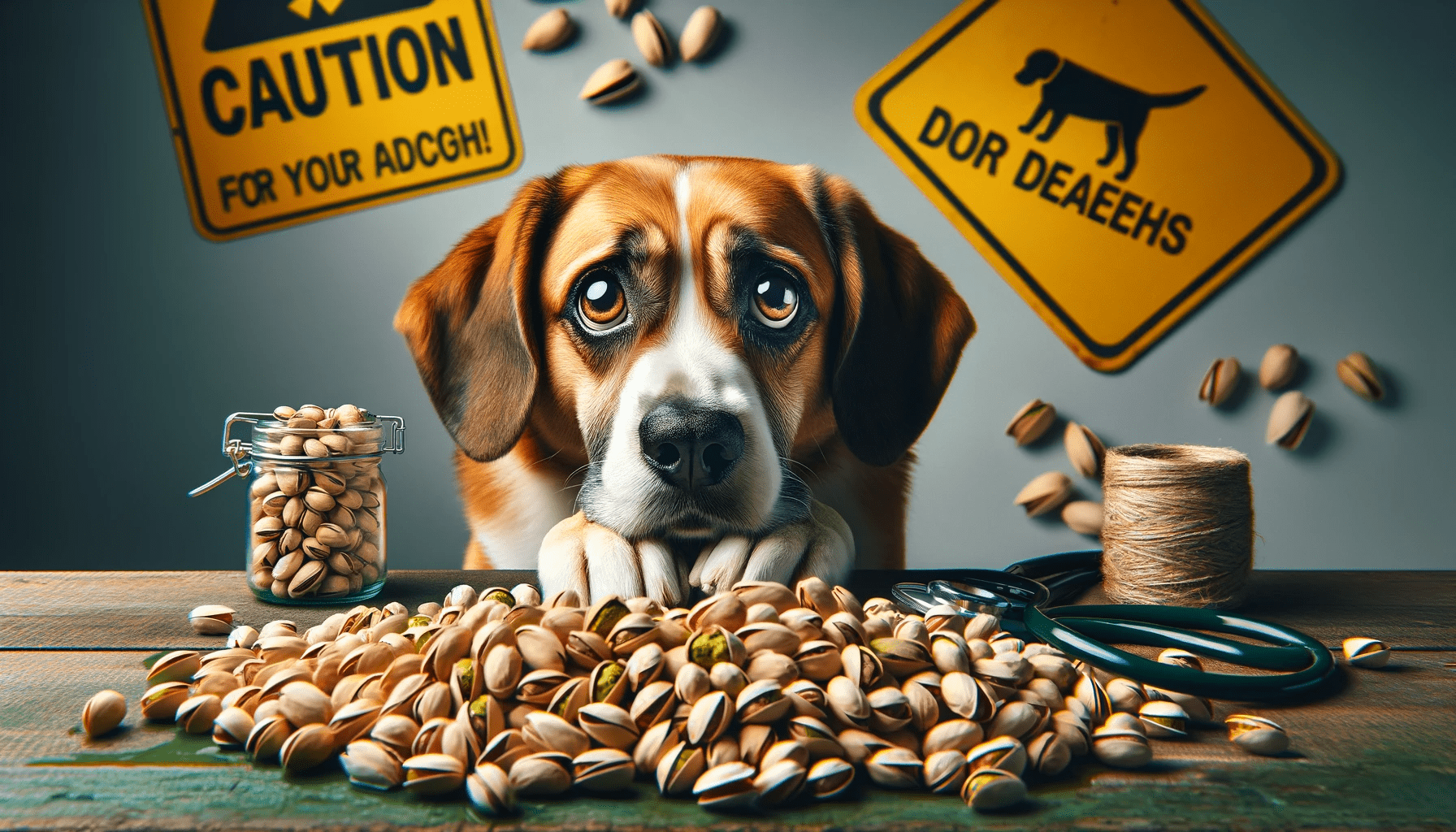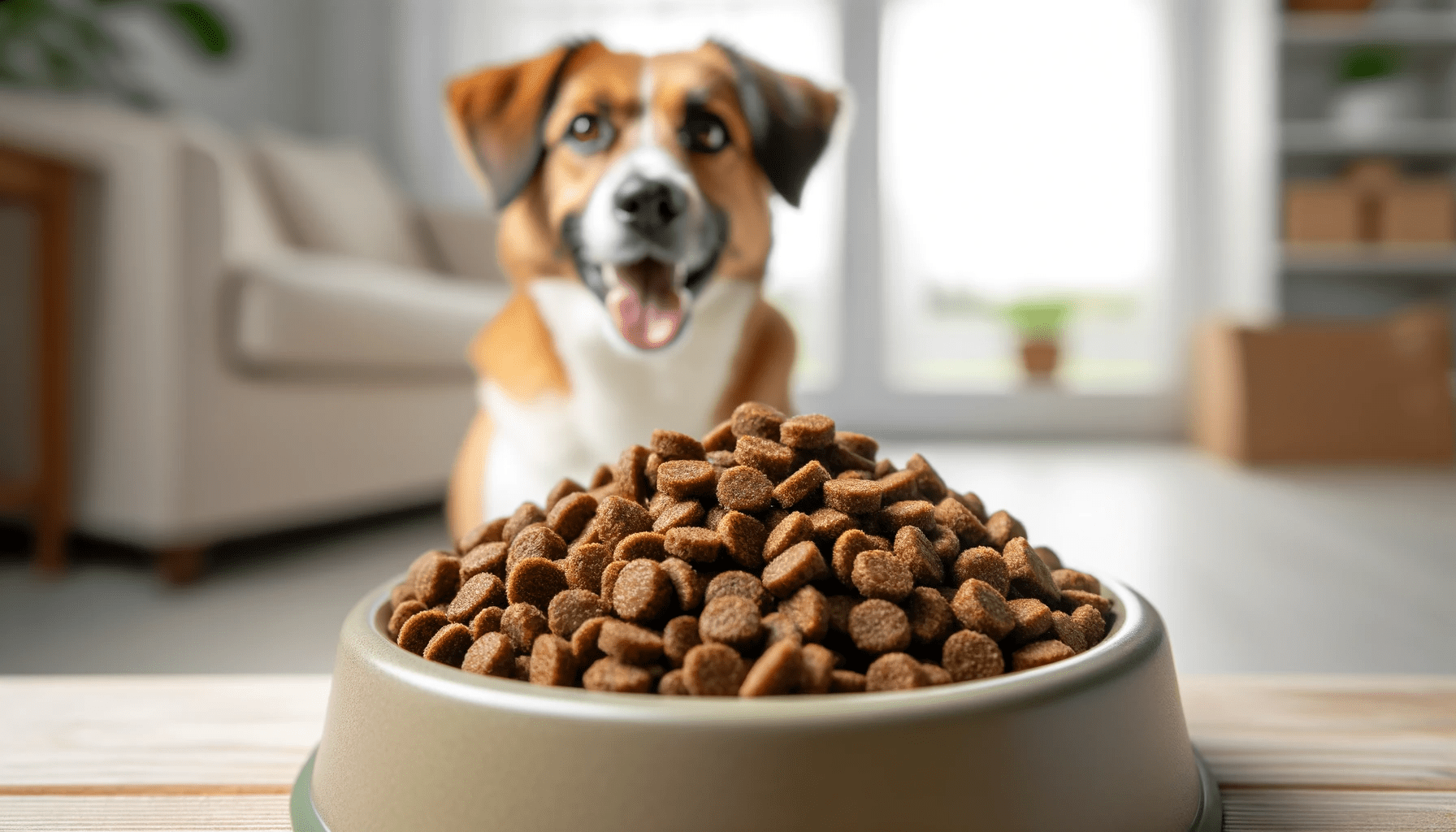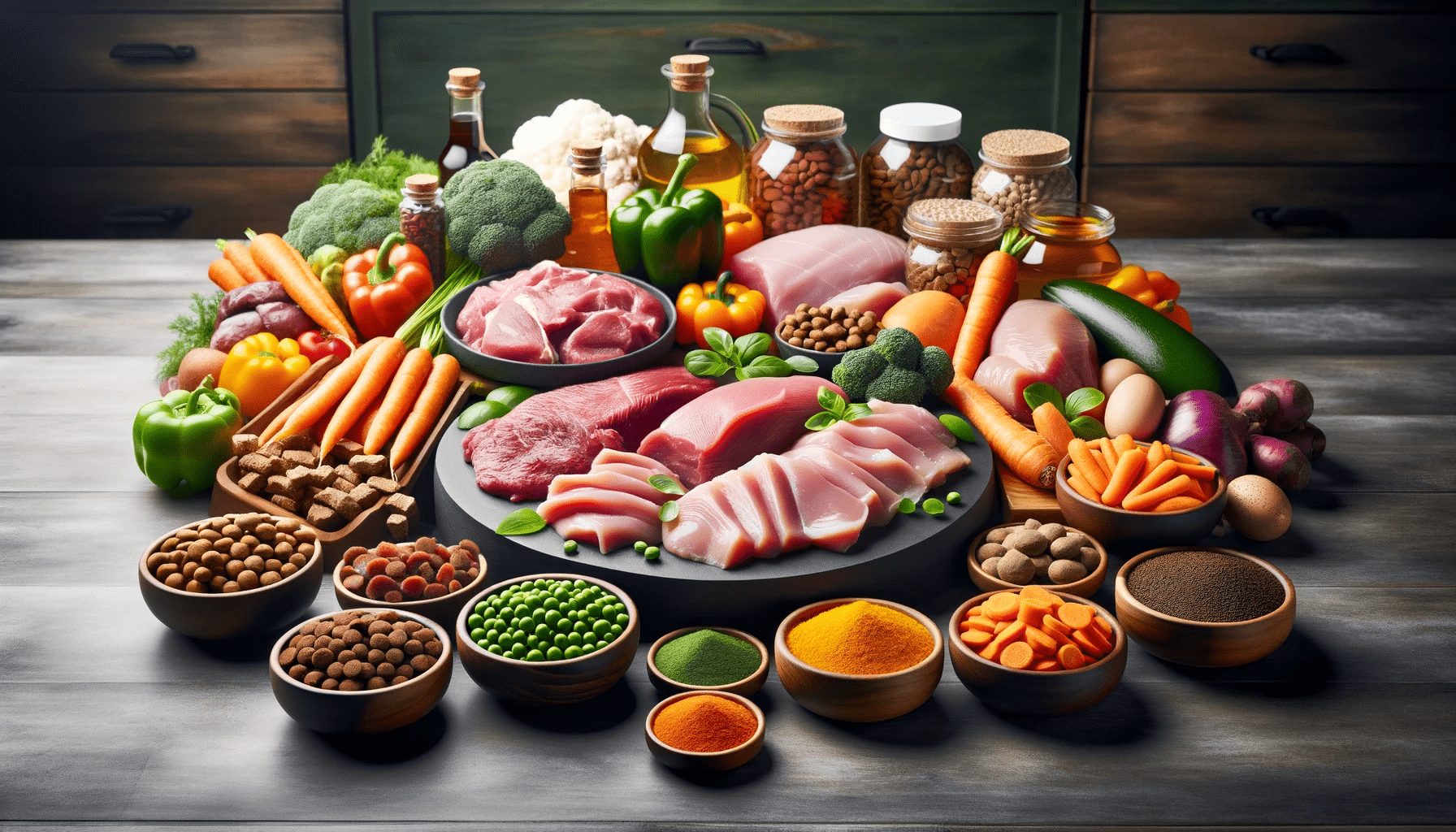Looking to enhance your dog's nutrition naturally? You're in the right place!
Discover simple tips to optimize your furry friend's diet and ensure they're getting the best nutrition possible. From understanding their dietary needs to choosing high-quality, natural dog food, we've got you covered.
Learn how to incorporate fresh fruits and vegetables, lean protein sources, and avoid artificial additives. Plus, find out how to provide proper hydration and consider natural supplements for added nutrition.
Your dog's health starts with their diet – let's make it the best it can be!
Key Takeaways
- Dogs need a balanced diet with high-quality animal protein.
- Natural dog food promotes better digestion and gut health.
- Fresh fruits and vegetables provide essential vitamins and minerals for dogs.
- Avoiding artificial additives and preservatives is important for a healthier diet for dogs.
Understand Your Dog's Dietary Needs
To enhance your dog's nutrition naturally, it's crucial to understand their dietary needs. Dogs have specific dietary requirements that must be met to ensure their overall health and well-being. One of the most common dietary mistakes dog owners make is feeding their pets a diet that's inappropriate for their species. It's important to remember that dogs are carnivores, and their bodies are designed to digest and derive nutrition from animal-based sources. Providing a balanced diet that includes high-quality animal protein is essential for your dog's health.
Another common mistake is overfeeding. Many dog owners tend to overestimate the amount of food their pets need, leading to weight gain and other health issues. Understanding your dog's individual needs, including their age, breed, and activity level, will help you determine the appropriate portion size.
Additionally, it's important to avoid feeding your dog table scraps or human food, as this can lead to nutritional imbalances and digestive problems. By understanding your dog's dietary requirements and avoiding common mistakes, you can ensure that your furry friend receives the nutrition they need to thrive.
Choose High-Quality, Natural Dog Food
When it comes to choosing dog food, opting for high-quality, natural options can provide numerous benefits for your furry friend.
Natural dog food is made with wholesome ingredients and avoids the use of artificial additives, preservatives, and fillers that may be found in lower-quality options.
Benefits of Natural Food
By choosing high-quality, natural dog food, you can enhance your dog's nutrition naturally. Here are three benefits of feeding your dog natural food:
- Benefits of Homemade Meals: When you prepare your dog's meals at home, you have full control over the ingredients. You can choose fresh, wholesome ingredients and avoid harmful additives or preservatives. Homemade meals can also be tailored to meet your dog's specific dietary needs, such as allergies or sensitivities.
- Advantages of a Raw Food Diet: Raw food diets, also known as a BARF (Biologically Appropriate Raw Food) diet, consist of uncooked meat, bones, fruits, and vegetables. This diet mimics a dog's natural diet in the wild and can provide numerous benefits, including improved digestion, healthier skin and coat, and increased energy levels.
- Higher Nutritional Value: Natural dog food is made from high-quality ingredients that are minimally processed. This helps preserve the natural nutrients, vitamins, and minerals present in the ingredients, providing a more nutritionally balanced diet for your dog. Additionally, natural dog food often contains a higher percentage of protein, which is essential for your dog's muscle development and overall health.
Healthier Digestion With Naturals
Choose high-quality, natural dog food for healthier digestion with naturals.
When it comes to your dog's digestion, natural remedies can be highly beneficial. One key factor in promoting better digestion is selecting high-quality, natural dog food. These types of foods are often made with wholesome ingredients and are free from artificial additives that can irritate the digestive system.
Additionally, natural dog foods may contain probiotics, which play a crucial role in improving digestion. Probiotics are beneficial bacteria that help maintain a healthy balance in the gut, aiding in the breakdown and absorption of nutrients.
Include Fresh Fruits and Vegetables in Their Diet
To naturally enhance your dog's nutrition, incorporate fresh fruits and vegetables into their diet. Adding these natural foods can provide numerous health benefits and improve overall well-being. Here are three reasons why you should include fresh fruits and vegetables in your dog's diet:
- Increased Nutrient Intake: Fresh fruits and vegetables are packed with essential vitamins, minerals, and antioxidants that can support your dog's immune system and promote optimal health. By incorporating a variety of colorful fruits and vegetables, you can ensure that your dog receives a wide range of nutrients.
- Improved Digestion: Many fruits and vegetables contain high levels of fiber, which can aid in digestion and prevent constipation in dogs. The fiber content can also help regulate bowel movements and promote a healthy gut.
- Natural Dental Care: Some fruits and vegetables, such as carrots and apples, have a natural crunchy texture that can help clean your dog's teeth and reduce plaque buildup. Chewing on these foods can also strengthen their jaw muscles and provide mental stimulation.
When introducing fresh fruits and vegetables into your dog's diet, it's important to do so gradually and in moderation. Consult with your veterinarian to ensure that you're offering the right types and amounts of fruits and vegetables for your dog's specific nutritional needs.
Incorporate Lean Protein Sources
Include lean protein sources in your dog's diet to further enhance their nutrition naturally. Incorporating vegetarian options can be a great way to provide your dog with the protein they need while also promoting a healthy and balanced diet. There are various plant-based protein sources that can be included in their meals, such as lentils, chickpeas, and quinoa. These options not only offer protein but also provide essential nutrients like fiber and vitamins.
When introducing lean protein sources into your dog's diet, it's important to consider portion control. Dogs require a specific amount of protein depending on their size, age, and activity level. Too much protein can be harmful, leading to weight gain and potential health issues. On the other hand, insufficient protein intake can result in muscle loss and weakness.
To ensure the right amount of protein, consult with your veterinarian to determine your dog's individual needs. They can provide guidance on portion sizes and the appropriate lean protein options to include. Additionally, monitoring your dog's weight and body condition regularly will help you adjust their diet accordingly.
Avoid Artificial Additives and Preservatives
One way to enhance your dog's nutrition naturally is by avoiding artificial additives and preservatives in their diet. By choosing to feed your furry friend a diet free from synthetic ingredients, you can provide them with numerous benefits.
Here are three reasons why avoiding artificial additives and preservatives is important for your dog's health:
- Improved Digestion: Artificial additives and preservatives can be difficult for dogs to digest. These synthetic ingredients can lead to digestive issues such as upset stomach, diarrhea, and even food allergies. By opting for a natural diet, you can help promote better digestion and overall gut health for your canine companion.
- Reduced Risk of Health Problems: Artificial additives and preservatives have been linked to various health problems in dogs. These include allergies, skin irritations, respiratory issues, and even certain types of cancer. By eliminating these synthetic ingredients from your dog's diet, you can lower their risk of developing these health issues.
- Increased Nutritional Value: Homemade dog food allows you to have control over the ingredients, ensuring that your dog receives optimal nutrition. By avoiding artificial additives and preservatives and using fresh, natural ingredients, you can provide your dog with a well-balanced and nutrient-rich diet.
Provide Proper Hydration for Your Dog
Proper hydration is essential for maintaining your dog's overall health and well-being. Just like humans, dogs need to drink enough water to stay hydrated and support their bodily functions. Water is crucial for digestion, circulation, temperature regulation, and nutrient absorption. It helps to flush out toxins and keeps your dog's organs functioning optimally.
To ensure proper hydration for your dog, make sure they always have access to fresh, clean water. Keep their water bowl filled throughout the day, especially during hot weather or after physical activity. It's important to monitor your dog's water intake and adjust accordingly, as factors like age, size, activity level, and health condition can affect their hydration needs.
If you notice that your dog is drinking excessively or not drinking enough, it could be a sign of an underlying health issue. Increased water intake can indicate conditions like diabetes or kidney disease, while decreased water intake can be a sign of dehydration or illness. If you have concerns about your dog's water intake, consult with your veterinarian for guidance and appropriate measures.
Consider Natural Supplements for Added Nutrition
When it comes to enhancing your dog's nutrition naturally, considering natural supplements can provide a number of benefits.
These supplements can help fill any nutritional gaps in your dog's diet and support their overall health and well-being.
Some recommended natural supplements for dogs include omega-3 fatty acids, probiotics, and multivitamins.
Benefits of Natural Supplements
Consider incorporating natural supplements into your dog's diet to enhance their nutrition. Natural supplements can provide additional support and benefits to your furry friend's overall health.
Here are three key benefits of natural supplements for dogs:
- Joint Health: Natural supplements like glucosamine and chondroitin can help support your dog's joint health and mobility. These supplements promote healthy cartilage and reduce inflammation, which is especially beneficial for older dogs or breeds prone to joint issues.
- Coat and Skin Health: Omega-3 fatty acids, such as fish oil, are excellent natural supplements for promoting a healthy coat and skin. These supplements can help reduce itchiness, dryness, and inflammation, resulting in a shiny and lustrous coat for your furry companion.
- Immune System Support: Natural supplements like vitamins C and E, as well as antioxidants, can provide a boost to your dog's immune system. These supplements help strengthen your dog's natural defenses, making them less susceptible to illnesses and infections.
Recommended Natural Supplements
To enhance your dog's nutrition naturally, include recommended natural supplements in their diet. Natural supplements can provide additional benefits and support your dog's overall health and well-being.
When it comes to allergies, consider using supplements such as fish oil, which contains omega-3 fatty acids that can help reduce inflammation and alleviate itching and skin irritation. Other natural supplements like quercetin and bromelain can also aid in relieving allergy symptoms by acting as natural antihistamines.
For joint health, glucosamine and chondroitin are commonly recommended supplements. They help promote joint function and reduce inflammation, making them beneficial for dogs with arthritis or joint problems. Additionally, turmeric and ginger are natural supplements that possess anti-inflammatory properties and can provide relief for joint pain and stiffness.
Including these natural supplements in your dog's diet can help improve their overall nutrition and support their specific health needs.
Integrating Supplements Effectively
To effectively integrate supplements into your dog's diet and enhance their nutrition naturally, it's important to consider adding natural supplements for added nutrition. These supplements can provide essential vitamins, minerals, and other nutrients that may be lacking in your dog's regular diet.
Here are three key ways to integrate supplements efficiently:
- Choose natural alternatives to supplements: Instead of relying solely on synthetic supplements, consider natural alternatives such as fresh fruits and vegetables, herbs, and other whole foods that can provide similar benefits.
- Consult with a veterinarian: Before adding any supplements to your dog's diet, it's important to consult with a veterinarian. They can help determine which supplements are appropriate for your dog's specific needs and recommend the right dosage.
- Gradually introduce supplements: To help your dog adjust to the new supplements, it's best to introduce them gradually. Start with a small amount and increase the dosage over time. This will allow your dog's digestive system to adapt and avoid any potential digestive issues.
Frequently Asked Questions
Can I Feed My Dog a Vegetarian or Vegan Diet?
Yes, you can feed your dog a vegetarian or vegan diet. However, it's important to note that dogs are natural carnivores, and a meat-based diet provides essential nutrients. Vegan diets may pose potential risks to their health.
How Do I Know if My Dog Is Getting All the Necessary Nutrients From Their Diet?
To ensure your dog is getting all necessary nutrients, look for signs of deficiency like dull coat or low energy. Provide a balanced diet by including proteins, vegetables, and grains. Consult a vet for guidance.
Can I Give My Dog Raw Meat as Part of Their Diet?
Yes, you can give your dog raw meat as part of their diet. However, there are pros and cons to consider. Raw meat provides natural enzymes, but it can also pose health risks. Alternative protein sources like cooked meat and plant-based proteins are also beneficial.
Are There Any Specific Fruits or Vegetables That Are Harmful to Dogs?
Some fruits and vegetables can be harmful to dogs, so it's important to know which ones are safe. The best fruits and vegetables for your dog's health include apples, carrots, and blueberries.
Can I Give My Dog Homemade Meals Instead of Commercial Dog Food?
Yes, you can give your dog homemade meals instead of commercial dog food. There are many benefits to homemade dog meals, including better control over ingredients and the ability to cater to specific dietary needs.
Conclusion
To ensure your dog receives optimal nutrition, it's important to understand their dietary needs and choose high-quality, natural dog food.
Including fresh fruits and vegetables, lean protein sources, and avoiding artificial additives and preservatives will further enhance their diet.
Proper hydration is key, and natural supplements can provide added nutrition.
By following these simple tips, you can support your dog's overall health and well-being in a natural and effective way.






